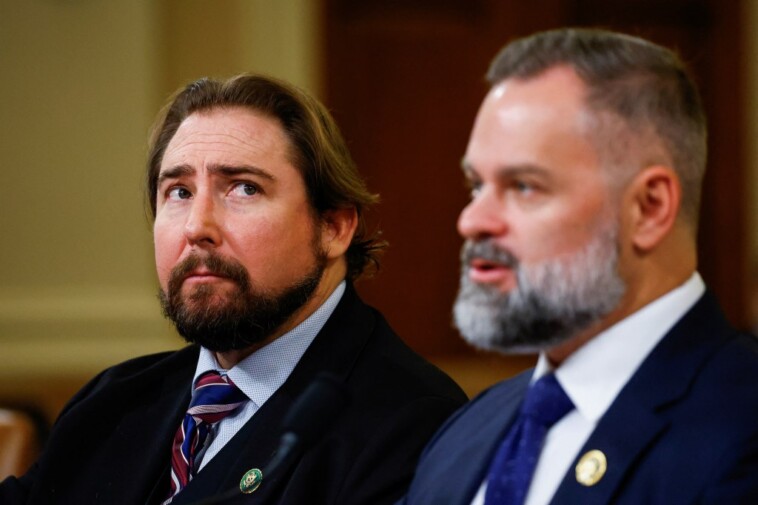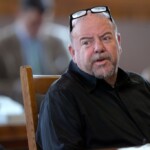A Republican member of Congress who served as a Navy SEAL sniper publicly cautioned former President Donald Trump on Thursday not to return to Butler, Pa., the site of an assassination attempt against him this past July 13, for another campaign rally next month due to its “alarming threat profiles.”
Rep. Eli Crane (R-Ariz.), who enlisted in the Navy after the Sept. 11, 2001, terrorist attacks and deployed three times as a SEAL, told members of the bipartisan task force investigating the assassination attempt that Trump should steer clear of the Butler Farm Show grounds given the Secret Service’s inability to provide adequate protection there.
“Though I appreciate the former president’s courage and strong desire to rally his supporters, I strongly suggest that he and his campaign avoid this site on Oct. 5 and in the future,” Crane warned.
“My suggestion to the former president and to his campaign is that he beef up his private security details with individuals who are loyal to him and not burdened by the bureaucracy and culture of an organization that many of us used to hold in high esteem,” he said in a swipe at the federal protective agency.
House task force chairman Mike Kelly (R-Pa.) listened intently to Crane and Rep. Cory Mills (R-Fla.), an Army veteran who also has experience as a sniper.
Neither Crane nor Mills are members of the task force, but were invited to give statements.
Kelly told Crane in response that he should not get his hopes up about the 45th president changing his mind and scrapping the Oct. 5 rally.
“The president has decided that he is going back to this site, and I think we know him well enough he defies any type of logic when it comes to, ‘Sir, we’re concerned about your safety,’ and his answer is always the same thing, ‘I’m committed to serving the people of this country.’”
Crane visited the site with Mills shortly after the shooting, with both assessing that it “was a horrible venue” for a rally and that the Secret Service “should have done everything to dissuade the campaign from holding it there.”
“It’s evident to me that many basic security measures were dropped,” Crane added. “You do not have to have a background in special operations to recognize the incompetence and security failures that led to the catastrophic vulnerabilities surrounding President Trump in the crowd that day.”
Within minutes of sweeping the rally site, Crane noted that counter-snipers should have been posted on a water tower, the tallest structure available, with a “commanding view over the entire property.”
Instead, the marksmen were perched on two barn roofs behind the main stage that had a partially obstructed view of would-be assassin Thomas Matthew Crooks, 20, who climbed unimpeded onto the roof of the American Glass Research building just 130 yards from where Trump spoke.
“Some of the main challenges facing Secret Service were completely avoidable,” Crane explained. “There’s simply no excuse.”
Crane also noted that neither Crooks nor Ryan Wesley Routh, who investigators say lay in wait for Trump for nearly 12 hours with an SKS rifle on his West Palm Beach, Fla., golf course Sept. 15, were trained professionals.
“I can tell you that with authority by the weaponry and the gear they used as well as the fact that Thomas Crooks took a headshot,” the Arizonan testified. “I can also tell by examining Ryan Routh’s final firing position on the fence line of the golf course that he too is not a professional.”
Snipers are trained to shoot at a target’s “center mass” rather than the head, which can move more quickly, and would never allow ballistic plates or a rifle barrel to protrude from their hidden position, Crane added.
Crooks was killed by a Secret Service counter-sniper after firing off eight rounds that killed Corey Comperatore, 50, critically injured David Dutch, 57, and James Copenhaver, 74, and struck Trump in the right ear.
Another Secret Service agent fired on Routh in his sniper’s nest off the sixth hole of Trump International Golf Club West Palm Beach before the 58-year-old was able to get a shot off.
Routh fled and was later arrested and hit with five charges, including attempted assassination of a presidential candidate, which could send him to prison for life if convicted.
“What is going to happen, Mr. Chairman, when the president of Iran, China, Russia or any other country or group who does not want to see President Trump come back into office, send professionals?” Crane asked Kelly.
Rep. Michael Waltz (R-Fla.), another task force member, told reporters that a suspected Iranian agent who was plotting an assassination attempt against Trump was foiled by the feds and arrested on July 12, the day before the rally, but the Secret Service was never notified.
“What is going to happen next time if there is a 10-man Hezbollah team, snipers, assaulters and drone operators launching coordinated and overlapping assassination attempts on the former president?” he asked. “I think we can all see by now that their likelihood of success would be tremendous.”








